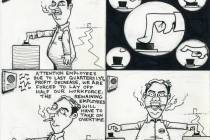Only one side using violence over genetically modified food
A couple of years ago I received a news release from the University of Nevada, Reno about the activities of a group of students who called themselves Team Nevada. They were working on genetically altered rice to provide nutrients to the malnourished.
Should we kill them?
The question no doubt sounds outrageous, even despicable, but there are parts of our society where such things are advocated.
What we’re talking about is called transgenic food. Critics call it “genetically modified” food or organisms to make it sound like something out of a 1950s sci-fi movie. It is altered genetically, a practice that has been going on for centuries. The only difference today is that now it’s happening in laboratories. There’s no difference between the two methods, however, and MOST of the food we already eat is genetically modified.
Liberals have been in the forefront of the anti-transgenics movement, and their behavior has been similar to that of conservatives who claim there is no global warming – cherry picking the science, anecdotal evidence, following dogma over science. It’s part of what Scientific American has called the “liberal war on science.”
The anti-transgenics movement has been so successful that in many parts of the world where food is desperately needed, the prejudice against transgenics and legal restrictions prevents its use, though organic crops produce less food and use more land and water.
Many advocates of organic foods hate trangenics with a fervor that frequently seems obsessive. Supporters of transgenics have no particular problem with organics.
The science is so heavily in favor of transgenics that some parts of the organic food movement, stymied by evidence, have been drifting over the line into violence. Last year in Oregon, more than 6,000 sugar beet plants were destroyed in two incidents. In Hawaii, modified papaya trees were cut down. In the Philippines, a mob of 400 people destroyed fields of golden rice, a modified rice that helps solve Vitamin A deficiency and thus prevents blindness in children. Vitamin A deficiency also impedes the immune system and kills a couple of million children each year. An angry Australian scientist, Jim Peacock, said, “It is so easy for the anti-science people, the anti-GM people like Greenpeace, to make statements against the GM in a very general and very often completely inaccurate [way]…” (For more, see http://allowgoldenricenow.org/.)
In July of this year, prominent organics supporter Mike Adams, who calls himself the “health ranger,” posted an essay that analogized his movement to the men who tried to assassinate Hitler and transgenic supporters to collaborators — and proposed killing them: “Thus, GMOs aren’t based in science at all. They are the domain of a radical cult where questions are not allowed and critical thinking is condemned and censored. … it is the moral right — and even the obligation – of human beings everywhere to actively plan and carry out the killing of those engaged in heinous crimes against humanity.”
Of course, in contrast with the U.S., law enforcement and the judicial system in Nazi Germany had broken down. The FBI launched an investigation of Adams, which is unfortunate. Competing views should be resolved in an open exchange of ideas, but Adams invited it.
As best I can tell, supporters of transgenics have never needed or used violence. They wield the merits of their case. Paradoxically, organics supporters claim that non-organic foods can cause violent tendencies, yet they are the ones employing violence.
The late George McGovern, President Kennedy’s Food for Peace director and President Clinton’s ambassador to the United Nations food agencies in Rome, said, “Scientific agriculture has been an enormous blessing to the world,” and called for the use of transgenic rice. Greenpeace opposes its use, never mind blind children.
Dennis Myers is an award winning journalist who has reported on Nevada’s capital, government and politics for several decades. He has also served as Nevada’s chief deputy secretary of state.
















